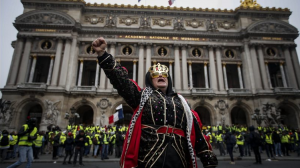The yellow vests in France and Belgium may be only the tip of the iceberg of a major social upheaval ahead of the European elections, with a common denominator: people protesting their worsening living standards do not want to be represented by the existing political forces.
The “usual suspect” for rocking the boat ahead of the 26 May European elections was the refugee crisis. To a large extent, the massive arrival of migrants to Europe influenced the British ahead of the 2016 Brexit referendum. Though the “wisdom” of Prime Minister David Cameron to hold a referendum during the peak of an unprecedented migration crisis can be questioned.
Sweden is still in a political impasse, without a government, after the right made gains in the September elections on a hardline immigration platform.
And in Belgium, Prime Minister Charles Michel offered his resignation after his coalition partner N-VA abandoned ship on an anti-migration ticket.
But in other EU countries, political cataclysms took place because of reasons other than migration. In Slovakia, the prime minister was replaced largely as the result of an uproar following the killing of journalist Ján Kuciak. In Spain, PM Mariano Rajoy lost power after corruption scandals.
Italy is a special case: the country has always been a laboratory for political projects and has lately be tempted to test anti-establishment governance. 5-Star’s Luigi di Maio and Lega’s Matteo Salvini formed a government based on two major goals: stopping irregular migration and boosting welfare. The latter created tensions with the European Commission, cautious of maintaining the budget discipline in the eurozone.
Other governments didn’t make welfare a priority and paid a price. Events were accelerated by a rise in fuel prices, caused by global fluctuations but also tax policies aiming to improve air quality by reducing the use of diesel. From Bulgaria and Croatia (Bulgaria is the country with the lowest wages in the EU) to France and Belgium (where the wages are well above EU average levels) people took to the streets to protest.
In Portugal, France and Belgium, the protest movement took as its banner something everyone has at hand – the yellow vests obligatory in every car. People who support the movement, without joining the protesters, placed their yellow vest in a visible manner behind the windshield. This signalled that the ‘yellow vests’ enjoy a surprisingly high degree of support in society.
It’s interesting to note that in Hungary, despite the many motivations the opposition-minded people would have to stand up against the policies of Viktor Orbán, the common denominator that united them was of economic and social nature – the so-called “slave law”, allowing employers to ask staff to work up to 400 hours per year of overtime.
Source: euractiv
Ask me anything
Explore related questions





